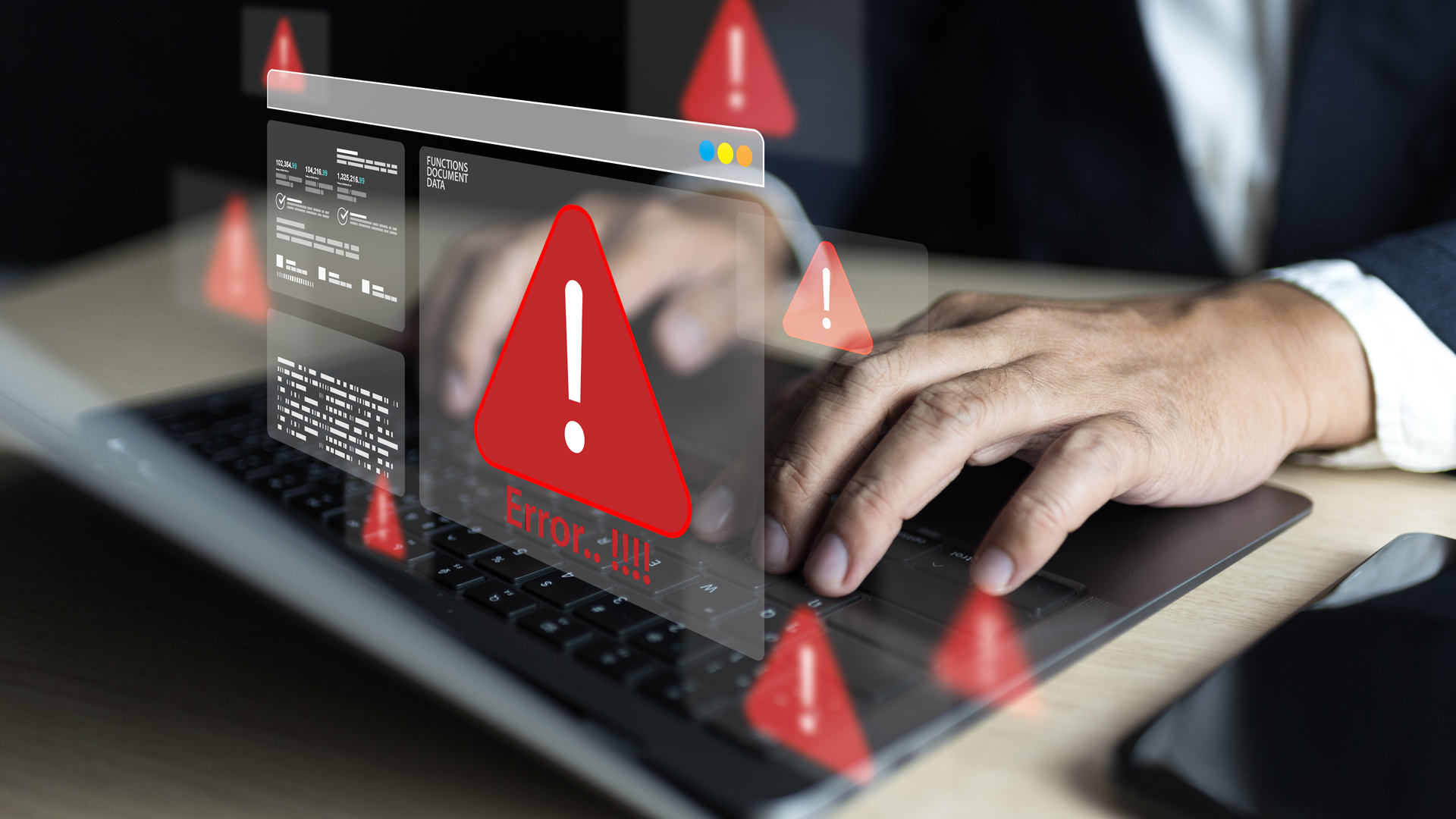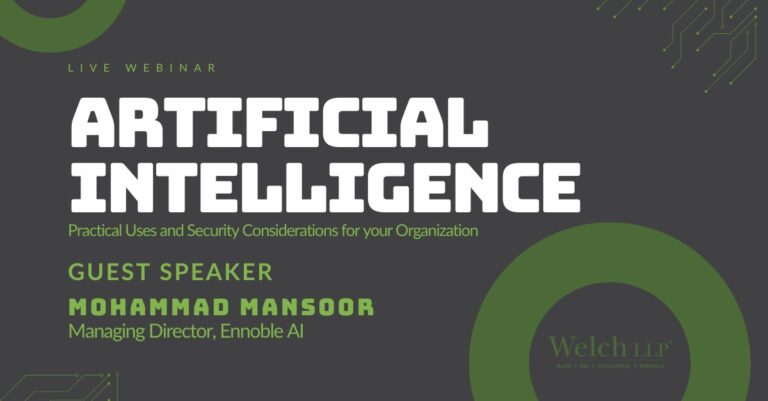What is technology risk, and why does it matter for growing businesses? It’s a question more leaders are asking as they adopt digital platforms, automate financial operations, and scale their infrastructure.
Technology risk is the potential for digital systems, services, and information to be compromised, fail, or perform below expectations. For businesses, effectively managing these risks is essential for mitigating risks associated with financial loss, reputational damage, data breaches, and unforeseen service disruptions.
This blog explains what technology risk means in a business context, why it matters, and how businesses can manage it. Welch LLP’s Risk Advisory team can provide practical strategies and guidance to help your business manage risk through cybersecurity, business resilience, data protection, and governance, risk, and compliance.
What Does Technology Risk Mean for a Growing Business?
Technology risk refers to the potential for digital systems or processes to fail, become compromised, or underperform, resulting in operational disruption, financial loss, or reputational damage. In today’s digital landscape, technology risk has moved beyond the IT department — it’s a strategic business priority for every growing organization.
These risks may include data breaches, system downtime, failures by third-party vendors, or outdated infrastructure. A single missed update or unsecured connection can expose sensitive financial information, delay service delivery, or impact regulatory compliance.
As businesses expand, their technology systems must scale accordingly. However, without a structured risk based approach, the likelihood and impact of tech-related disruptions also grow. This is where proactive planning comes in, enabling you to anticipate and mitigate potential risks, rather than just react to them.
Why Is Cybersecurity Risk Management Important?
Cybersecurity risk management is about identifying, assessing, and mitigating risks to digital assets and systems. For growing businesses, it’s essential to ensuring financial and operational resilience while its most sensitive assets.
A study published in ScienceDirect highlights how technology risk governance is becoming increasingly relevant as businesses shift to digital models.
As more organizations embrace technology, managing risk has become a critical business issue — not just an IT concern. Yet many small and mid-sized companies still believe they’re too small to be targeted, leaving them vulnerable to increasingly sophisticated attacks.
That’s where independent cybersecurity consulting helps. Subject matter experts provide the objectivity and experience needed to identify vulnerabilities, build practical action plans and roadmaps, and strengthen both technical and human defenses.
At Welch LLP, our Cybersecurity and Technology Risk team delivers tailored cybersecurity assessments that help organizations align technology with business strategy and compliance requirements — building trust and resilience in an increasingly complex digital world.
How Can Data Strategy Help Manage Technology Risk?
A clear data strategy is the cornerstone of effective technology risk management. As businesses scale, the volume and complexity of their data grows just as quickly — and without a plan for how that data is collected, organized, and protected, inefficiencies and security risks can multiply.
A strong data strategy isn’t just about storage. It defines who can access information, how it flows between systems, and how it’s used in critical processes like financial reporting. Weak data practices can lead to operational inefficiencies, reporting errors, and compliance challenges — and, over time, can undermine stakeholder confidence.
Integrating data governance with cybersecurity enhances your overall risk posture. This can include at rest and in-transit encryption, controlling and managing user access to systems, and implementing automated backup and recovery processes.
For many small and mid-sized businesses, expert guidance — and a clear framework — make all the difference. Welch LLP’s Risk Advisory team helps organizations align their technology and data priorities within a structured approach that ensures your data strategy supports growth rather than slowing it down.
Webinar: Artificial Intelligence – practical uses and security considerations in your business environment
What Are Penetration Tests and SOC Reports, and Why Do They Matter?
As your business grows, so does its exposure to technology risk. Penetration testing simulates a real-world cyberattack to uncover system weaknesses before they can be exploited by a malicious attacker. It’s also an effective way to prepare for client onboarding, audits, or partnerships that require security assurance.
A SOC (System and Organization Controls) report independently validates your organization’s security and compliance controls, showcasing transparency and strengthening trust with actual or potential customers and partners. It demonstrates your commitment to security, data protection, and governance.
Welch LLP’s Risk Advisory team provides end-to-end support, from preparing for SOC audits to conducting penetration tests. By combining cybersecurity and compliance expertise, we help organizations strengthen their controls and enhance stakeholder trust.
Frequently Asked Questions
What is an example of technology risk in accounting?
An example of technology risk in accounting is unauthorized access to financial systems, which can lead to data breaches, altered records, or financial misstatements.
How can small businesses reduce technology risk?
Small businesses can reduce technology risk by securing data, training staff, keeping systems updated, collaborating with external experts, and regularly testing defenses.
Why is data strategy important for financial operations?
A strong data strategy ensures your is accurate, complete, accessible, and secure — reducing the risk of reporting errors, duplication, or data breaches.
What does penetration testing do for small businesses?
Penetration testing reveals where your systems are most vulnerable — giving you the insight to fix gaps and protect your business before attackers find them
What are SOC reports, and why do they matter?
A SOC report validates that your organization’s controls are effective and reliable. It demonstrates transparency, strengthens client confidence, and supports compliance with industry expectations.
Get a Strategic Partner in Risk Advisory
Technology risk shouldn’t slow your growth; it should inform how you manage it. Welch LLP’s Digital Services team provides tailored assessments, actionable plans, and solutions to help your business strengthen its security posture and overall resilience. Whether you need cyber risk assessments, penetration testing, third party assurance (SOC 1 and 2), compliance readiness, incident response planning, or vCISO services, we’re here to help.
Contact us today to learn how our risk experts can help you stay protected while staying ahead.








